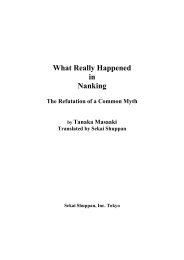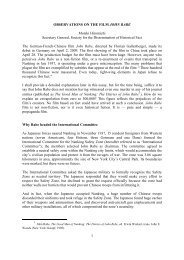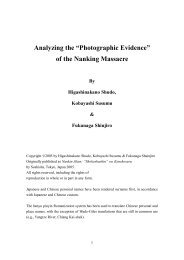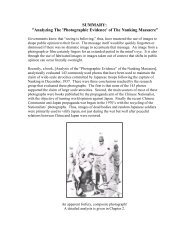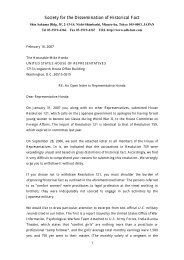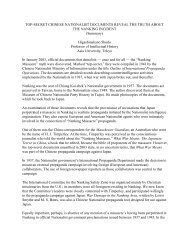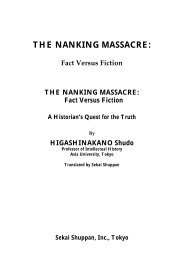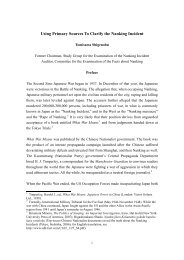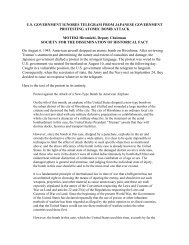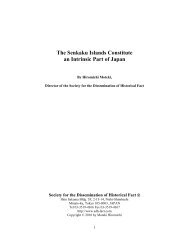Author Profile: KASE Hideaki and SEKI Hei (Shi Ping) I. KASE ...
Author Profile: KASE Hideaki and SEKI Hei (Shi Ping) I. KASE ...
Author Profile: KASE Hideaki and SEKI Hei (Shi Ping) I. KASE ...
- TAGS
- kase
- author
- hideaki
- seki
- sdh-fact.com
Create successful ePaper yourself
Turn your PDF publications into a flip-book with our unique Google optimized e-Paper software.
<strong>Author</strong> <strong>Profile</strong>: <strong>KASE</strong> <strong>Hideaki</strong> <strong>and</strong> <strong>SEKI</strong> <strong>Hei</strong> (<strong>Shi</strong> <strong>Ping</strong>)<br />
I. <strong>KASE</strong> <strong>Hideaki</strong><br />
Mr. <strong>KASE</strong> <strong>Hideaki</strong> is one of the prominent <strong>and</strong> distinguished writers <strong>and</strong><br />
commentators active today on political, military <strong>and</strong> international affairs. He has<br />
hosted a number of TV <strong>and</strong> radio talk shows <strong>and</strong> is a frequent participant on such shows.<br />
He is ranked as one of the most popular lecturers in Japan.<br />
Mr. Kase also has served as a "special advisor" to Prime Ministers Takeo Fukuda <strong>and</strong><br />
Yasuhiro Nakasone. In addition, Mr. Kase has been an adviser to a number of<br />
government Ministers, including Foreign Minister Sunao Sonoda, in the Fukuda, Ohira<br />
<strong>and</strong> Suzuki Cabinets, <strong>and</strong> Mr. Kazuho Tanigawa, Minister of Defense (Director General<br />
of the Japan Defense Agency) in the Nakasone Cabinet. Mr. Kase also served a member<br />
of the Government Advisory Committee on national crisis management under the<br />
Nakasone Cabinet.<br />
Mr. Kase began his professional career as a journalist. He was a staff correspondent<br />
for United Press International (UPI) between 1959 <strong>and</strong> 1961. Over the years, as Mr.<br />
Kase gradually established himself as a writer <strong>and</strong> commentator, he has worked in many<br />
capacities. They include: as a commentator on industrial affairs for the Japanese<br />
National Broadcasting Co. (NHK); as a script writer for the Toho Picture Co.; <strong>and</strong> as an<br />
advisor for a number of major Japanese <strong>and</strong> foreign corporations.<br />
From 1968 to 1970, Mr. Kase served as the first Editor-in-Chief of the<br />
Japanese-language version of the Encyclopedia Britannica. In addition, Mr. Kase's<br />
writings <strong>and</strong> thoughts have been widely published in articles in most of Japan's major<br />
journals <strong>and</strong> are regularly featured in columns for leading magazines <strong>and</strong> daily<br />
newspapers in Japan <strong>and</strong> in the United States.<br />
Mr. Kase has served on the board of many Japanese cultural <strong>and</strong> research<br />
organizations <strong>and</strong> foundations, including the Japan PEN Club, the Japan Cultural Forum<br />
(Nihon Bunka Forum) <strong>and</strong> the Japan Foundation (Nihon Zaidan). Mr. Kase has seved<br />
also as Chairman of The Japan Center for the Study of Security Issues, one of Japan's<br />
leading private research institutes for strategic <strong>and</strong> international studies. Mr. Kase<br />
currently serves as Chairman of the Social Education Foundation (Shakai Kyoiku
Zaidan) <strong>and</strong> of the Japan Cultural Society (Nihon Bunka Kyokai). He is on the board of<br />
The Matsushita Institute of Government <strong>and</strong> Management (Matsushita Seikeijuku); the<br />
Japan Conference (Nihon Kaigi), a powerful conservative movement encompassing the<br />
nation’s leading business, political, religious <strong>and</strong> intellectual figures (Mr. Kase is<br />
Chairman of its Tokyo Chapter); He is chairman of the Japan-India Goodwill<br />
Association (JIGA); <strong>and</strong> many other non-profit public interest foundations. He is an<br />
advisor to the New Business Council, a national organization of businessmen engaged<br />
in new business, created by the Ministry of international Trade <strong>and</strong> industry, <strong>and</strong> to the<br />
Asia Business Forum. He is Professor of International Relations at Takushoku<br />
University. He is a policy advisor to the Maritime Safety Agency (Japan Coast Guard).<br />
Mr. Kase served as the chairman of the Production Committee of a major feature<br />
films “Pride,” which was released by Toei in May, 1998, <strong>and</strong> “Merdeka” which was<br />
released by Toho in May, 2001.<br />
Mr. Kase has served as an advisor to many leading corporations, including the Japan<br />
Air System (JAS), Nissho Iwai Corporation <strong>and</strong> Mitsui <strong>and</strong> Co.<br />
***<br />
Mr. Kase has published more than 100 books including one in English (Kamikaze<br />
Japan’s Suicide Gods, co-authored with Albert Axell, Longman, 2002), of which 55<br />
books were co-authored or anthologies, on a wide variety of subjects, including<br />
international relations, history, education, culture <strong>and</strong> comparative religion. He has<br />
published a book, “Korekara no Asia” (Emerging Shape of Asia), jointly with President<br />
Lee Teng Hui of Taiwan in September,1996. His autobiography was published in<br />
May, 2001.
II. <strong>SEKI</strong> <strong>Hei</strong> (<strong>Shi</strong> <strong>Ping</strong>)<br />
<strong>SEKI</strong> <strong>Hei</strong> (<strong>Shi</strong> <strong>Ping</strong>) was born in Sichuan province, China, in 1962. He<br />
earned a bachelor’s degree in philosophy at Beijing University, graduating<br />
in 1984. During his college days, <strong>Shi</strong> awakened to the fact that<br />
brainwashing was the hallmark of Maoist education; that epiphany inspired<br />
him to immerse himself in China’s democratization movement. After<br />
completing a graduate program in philosophy at Sichuan University in<br />
1988, he spent a year studying in Japan. The tragic events that took place at<br />
Tian’anmen Square in 1989 prompted him to bid a spiritual farewell to his<br />
native l<strong>and</strong>. <strong>Shi</strong> returned to Japan <strong>and</strong> enrolled in Kobe University’s<br />
Graduate School of Humanities. After receiving a Ph.D. in philosophy in<br />
1995, <strong>Shi</strong> worked at a private research institute. In Why the Chinese Hate<br />
the Japanese, issued by PHP Kenkyujo in 2002, he warned of mounting<br />
anti-Japanese sentiment in China. Since then <strong>Shi</strong> has been active as a<br />
commentator on problems involving China, <strong>and</strong> relations between Japan<br />
<strong>and</strong> China. He became a Japanese citizen in 2007.<br />
<strong>SEKI</strong> is a prolific writer. Among his publications are Exposing the Folly of<br />
the Belief that the 21 st Century Is China’s Century: Statistics Reveal the<br />
Hidden Truth (Nihon Bungeisha, 2002), How History Teaches Us that<br />
Friendship Between Japan <strong>and</strong> China Will Destroy Japan: Rules for<br />
Disengagement from China (Kodansha, 2005), The Future of<br />
Sino-Japanese Relations from a Chinese Perspective (Fusosha, 2006), I<br />
Was Chairman Mao’s Little Soldier (Asuka <strong>Shi</strong>nsha, 2007), China Will<br />
Bare Its Fangs in 2010 (PHP Kenkyujo, 2008), China in the Grip of<br />
Conspirators: 4,000 Years of Sorrow (PHP Kenkyujo, 2009); Eyewitness to<br />
the Collapse of China’s Economy (Kairyusha, 2009); <strong>and</strong> Cataclysmic<br />
China: Reflections on the 20 th Anniversary of the Tian’anmen Square<br />
Incident <strong>and</strong> Fears About the Future (KK Bestsellers, 2009).



